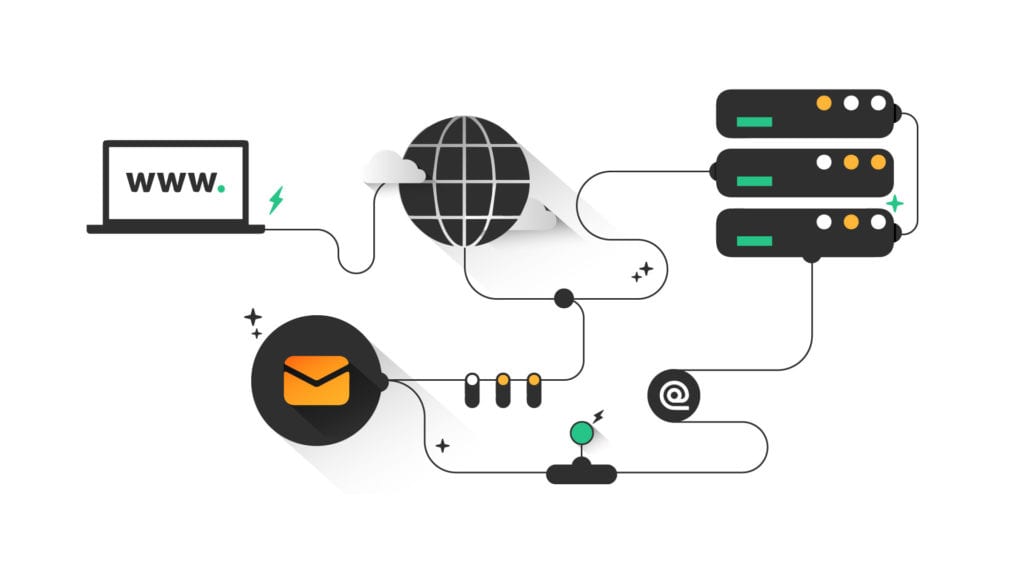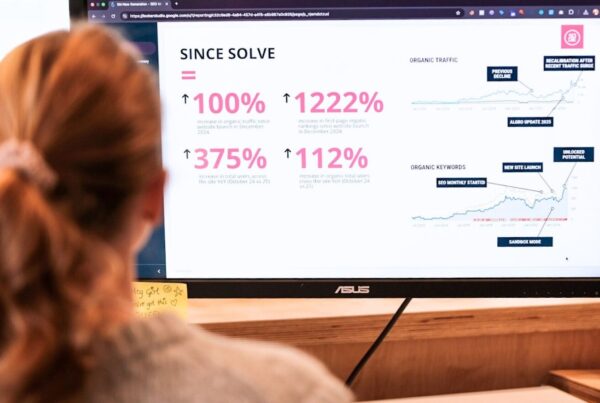
CDN, DNS, PHP, SSL…what!? These are just some of the acronyms that can leave you tearing your hair out when searching the internet for information on web hosting. We get it, hosting is pretty technical stuff, but all the specialist jargon and complicated terminology can leave website owners confused.
Here at Solve though, we’ve learnt to rein in our inner geek so that prospective clients can make the most informed decisions. So, when it comes to choosing the best web hosting, we’ve put together this easy-to-understand, jargon-busting, no-nonsense guide.
So, let’s start at the beginning…
What is web hosting?
Web hosting in simple terms refers to where your website lives. Although you might think of websites and the internet as magical, intangible forces that just float around in the atmosphere, every website, all its files and information, need to be stored somewhere – somewhere physical. And a website is not the type of thing you can just chuck on a USB stick. A website needs to be stored on a specialist server managed by a web hosting company.
What’s a server?
A server is basically a computer that stores and transfers information (or data) between your site and users across the internet. Every webpage in the world is stored on a server somewhere from e-commerce stores and blogs to social media sites and streaming services.
A web hosting company (or a web host) has a number of servers where they store websites securely on behalf of site owners.

So, how does web hosting work?
Web hosting is a bit like renting an apartment for your website to live in, complete with an on-site security guard and regular handyman for maintenance.
As part of web hosting, a host stores your website on one of their servers. By hosting your site, a host agrees to keep your website as safe and secure as possible, and they ensure users from all over the world can access your site quickly and easily at all times.
Having a good host is a key part of keeping your site secure, live and open for business.

Why does good web hosting matter?
1. Better website security
Good web hosting is a critical part of website security. Just like you take steps to secure your home from unwanted intruders, a web host has security features and measures in place to keep websites safe from hackers and data breaches. For example, a good web host will have substantial firewalls to build a secure fence around your site. And with things like malware scanning, a web host will regularly patrol your site looking for anything suspicious or out of place. A good web host will also take daily backups so that your site can be restored quickly if anything does go wrong. They will also ensure that all information passed between visitors and your website is secure and that it cannot be intercepted.
Here at Solve, we offer every hosting client SSL to ensure connections between the server and the user’s browser are secure. SSL is just a fancy name for an encrypted connection, but in terms of ranking and user experience, it’s really important. A site that has SSL will display a little padlock beside the address in the user’s browser as a badge of its safe and trusted status. Search engines will rank websites with SSL higher too, and even flag those without as unsecured to users!
We have such robust procedures in place at Solve that we offer a hack protection guarantee – fixing any unlikely hacks for free.

2. Faster website performance
Web hosting is also a major influencing factor in how fast your website loads. If your hosting doesn’t provide the right amount of server space and doesn’t ensure information transfers to and from your site efficiently, it can really slow down your website. Depending on your hosting package, there may be limits on how much data can be transferred or how many visitors can access your site, and if your needs go above these limits, it can affect your site performance. And users don’t like poor performing websites.
3. Prevent downtime
Good web hosting that’s secure, fast and appropriate for your website will help prevent downtime. An overloaded server or a security breach can cause websites to go offline, and that means you’re losing business. Efficient web hosting will keep your site live and accessible.
4. Improved user experience
Having a secure, fast site that’s readily accessible is paramount for user experience. And happy uses are good for SEO and sales. Studies suggest that even a 0.1-second increase in mobile load time can mean 8% more conversions in sales. So efficient web hosting is an important part of creating a positive user experience.

5. Better Search Engine Optimisation (SEO)
And it’s not just users that look for fast websites, search engines do too. Page speed is a confirmed ranking factor and search engines like Google rank faster sites higher. Some web hosts, like Solve, also have servers that are optimised for WordPress creating even more efficient, faster, smoother hosting that’s better for SEO.
6. Reduced environmental impact
And good web hosting can even be eco-friendly. The internet uses a staggering amount of energy, producing around one billion tonnes of greenhouse gases every year – about the same as the aviation industry. With an average website creating up to 4,700 pounds of CO2 a year, it’s important website owners consider the environmental impact of their website and how they can minimise it. At Solve, our clients know that while we’re working hard to ensure their website has a big impact online, it’s not actually having a big impact on the world. Our eco-friendly web hosting is powered by 100% renewable energy and we plant 100 carbon-absorbing trees every month to offset any other emissions.
Choosing the right type of web hosting
The type of web hosting you need depends on the size of your website and your traffic (i.e. the number of users visiting your site). The bigger your website, the more traffic you have, and so, the more storage space needed on a hosting server.
The main types of web hosting are:
- Shared web hosting – you share server space with other websites.
- Dedicated web hosting – you have your very own server that’s dedicated to your website only.
- Virtual Private Server (VPS) hosting – you have your own dedicated part of a shared server.
- Cloud hosting – your website’s data is stored across multiple virtual servers.
Every web host offers slightly different things, but the main decision to make is whether you need shared or dedicated hosting.
Shared versus dedicated hosting
Choosing the right web hosting is like choosing the right type of home. When you’re just starting out in life, your needs are minimal, so a room in a shared property might be just the budget-friendly ticket. But as you grow, you need a bigger place – your own home, dedicated just to your family. And this home needs to be safe and secure, with plenty of space for all the busy comings and goings of family life.
Choosing the best web hosting is pretty similar. When your business is young and your website needs are low (i.e. your site is small with a limited number of visitors), shared hosting can be a great, low-cost option. But as your business and website grow, you may need to switch to dedicated hosting with more space so that your site isn’t slowed down.
Here’s a summary of shared versus dedicated hosting:

Shared hosting
- Perfect for small websites with less traffic
- Most cost-effective form of web hosting
- Is available as optimised WordPress web hosting
But…
- The number of visitors and information transfers are limited every month.
- Site speed and security can be affected by other sites e.g. if a website has a surge in visitors, it can busy up the server and slow your site down.
To overcome some of the potential drawbacks of shared hosting, here at Solve we use trusted security plugins on our hosted sites and we run all information transfers through a Content Delivery Network (CDN) to ensure the most efficient, secure connections.
But what’s a CDN I hear you say??? A CDN is a fancy name for a network of servers based in different locations around the world. Having your website hosted through a CDN brings your site closer to visitors wherever they are across the globe, meaning it loads quicker.

Dedicated web hosting
- Best for big, established websites with lots of visitors
- Unlimited traffic and bandwidth, so better for speed and SEO
- Is available as optimised WordPress web hosting
But…
- It’s more expensive, so you don’t want to be paying for server space that you don’t need.
Here at Solve, we also offer shared dedicated hosting which has the cost-effective price tag of shared hosting with enhanced security and optimisation because your website only shares server space with other Solve-hosted sites. And like we said, all our web hosting is specially optimised for WordPress, ensuring the best possible load speed and performance.
Check out the full details of our eco-friendly, WordPress web hosting packages here.
Is web hosting different to a domain name?
Web hosting is different to a domain name, but you need both.
Web hosting gives your site somewhere to live but it needs an address so people can find it. The address of your website is called a domain name, e.g. solve.co.uk.
A domain is unique to your website and can be more or less anything you want, providing what you want isn’t already taken. You can buy your chosen domain from any number of providers and you need to renew it regularly to stop anyone else from pinching the address.
You can have more than one domain name to target different markets e.g. co.uk and .com, and these domain names can direct to different sites or to one main site.
So, if you change web hosts do you have to change your domain name? Nope. You can simply point the domain to the new server with a special code, and your web host can help with this.
How to choose the best web hosting provider
1. Look for results
There are so many web hosting providers out there promising the world. To choose the best web hosting for you, we recommend looking for proven results. For example, here at Solve by simply switching to our eco-friendly web hosting servers, we have improved load times for our clients by as much as 170%. Check out our results here.
2. Read reviews
Whether it’s Google reviews or Trustpilot, there are a range of review sites you can consult to see if your web host can back up their claims. Check out Solve’s 5-star reviews on Google.
3. Ask for guarantees
Good web hosts that are confident in their services will offer a guarantee. At Solve, we offer a hack protection guarantee. In the unlikely event of a hack, we’ll fix it for free.
4. Choose local servers
If you want your site to perform well (i.e. be fast loading, reliable and secure), having local servers to your customers is important. If you’re targeting UK or EU-based customers, it’s best to choose a web host that has servers in those markets. And if you want an international presence, you’ll want a web host that uses a CDN to localise your site to key markets across the globe.
5. Compare values
When choosing any partner agency it’s important to look at their values and ethics to ensure they align with yours. As a certified B Corp, helping our clients make a big impact online without having too much impact on the planet is very important to us at Solve. Websites use energy 24/7, so that’s why we choose to run our web hosting servers on 100% renewable energy. Find out more about our socially conscious, eco-friendly values here.
WordPress web hosting from Solve
So there you have it, an easy-to-understand, jargon-free, no-nonsense guide to web hosting. If you’d like to know more about our environmentally friendly web hosting or how we can help you make an impact online, get in touch with web whizz kids at Solve today.
Photo by Annie Spratt on Unsplash
Photo by İsmail Enes Ayhan on Unsplash
Diagram source: https://hostpapa.blog/





